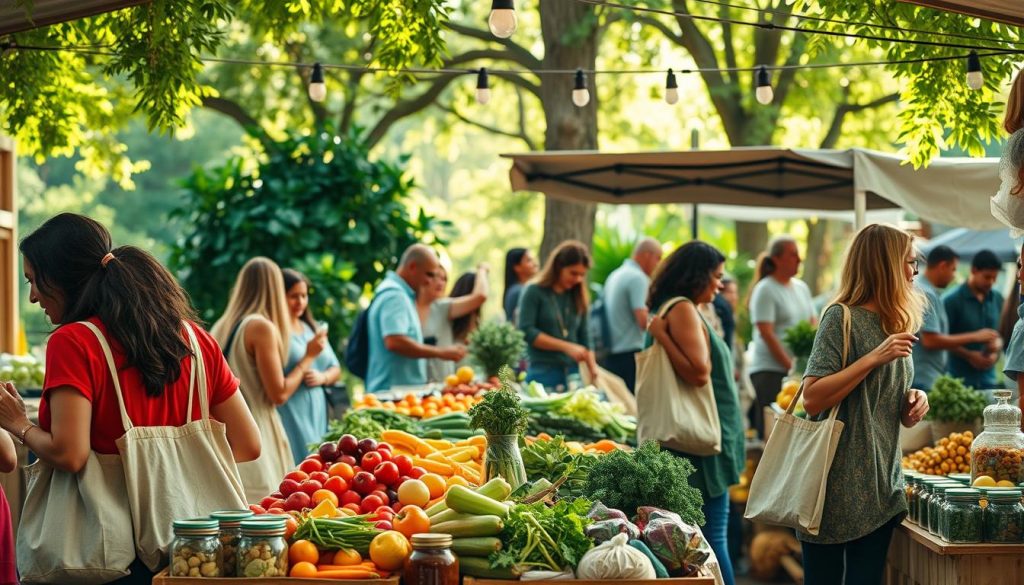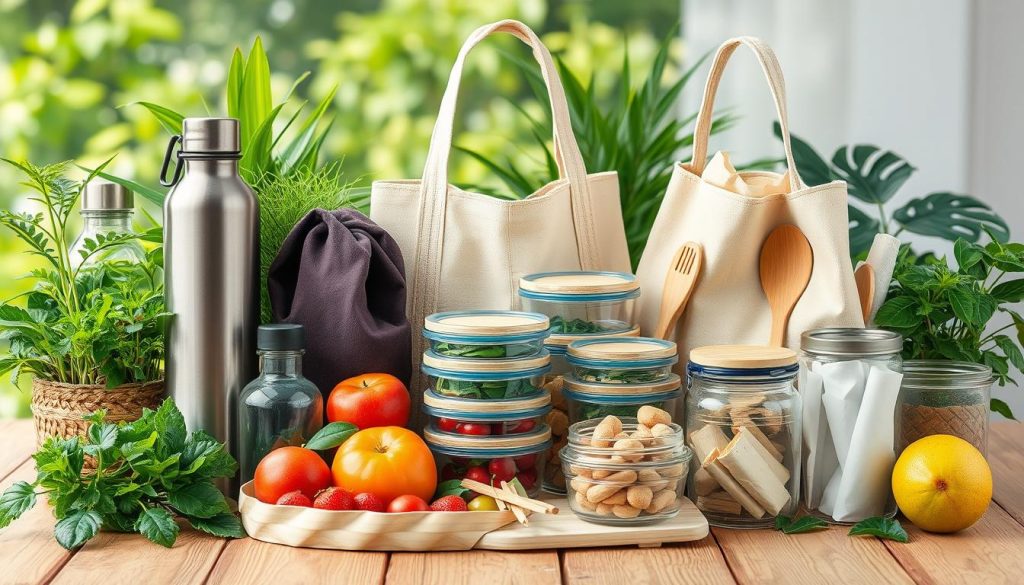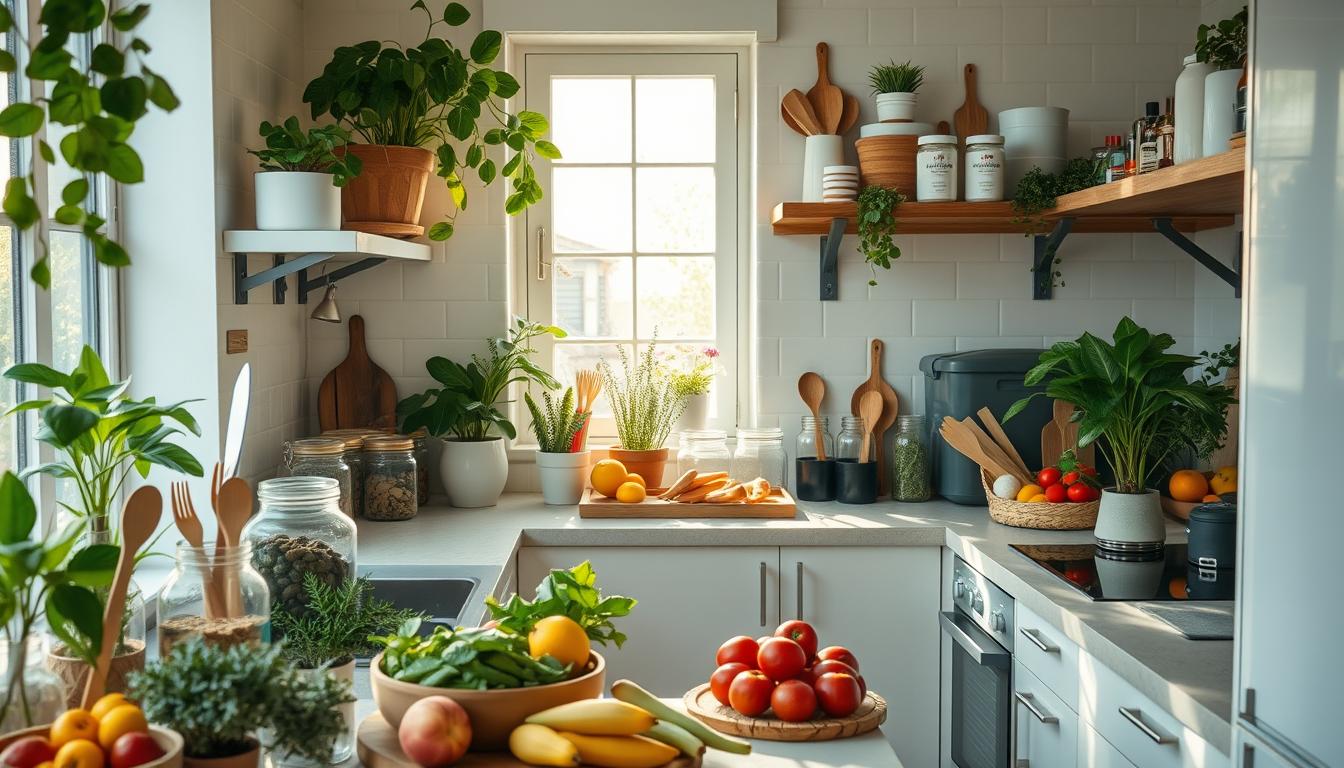I’ve always cared about the environment. But it wasn’t until I found the zero waste lifestyle that I felt I could really make a difference. This journey has shown me how our daily choices affect the planet.
Living with eco-friendly habits has changed how I live and what I buy. I now use reusable bags and compost kitchen scraps. Every small step I take helps make the future more sustainable. The zero waste lifestyle is about making progress and making choices that matter.
By choosing sustainable living, I’ve cut down my environmental impact and found a new purpose. It’s incredible how small changes can make a big difference. They not only help our planet but also make our lives more fulfilling.
Understanding the Zero Waste Lifestyle
Embracing a zero waste lifestyle is more than recycling. It’s a big change in how we think about using things and waste. Let’s explore what this lifestyle is and why it’s crucial for our planet.
What is zero waste?
Zero waste is a way of life that aims to reuse all products. The goal is to avoid sending anything to landfills, incinerators, or oceans. It’s about using a circular economy to reduce waste and use resources better.
The environmental impact of waste
Our current waste habits are bad for the environment. Landfills release methane, a strong greenhouse gas. Plastic waste also pollutes our oceans, harming sea creatures. By reducing waste, we can lessen these harmful effects.
Benefits of adopting a zero waste lifestyle
Choosing zero waste has many benefits. It cuts down our carbon footprint, saves money, and encourages us to think before we buy. Here are some key advantages:
| Benefit | Impact |
|---|---|
| Environmental | Reduces pollution and conserves resources |
| Economic | Saves money on disposable items |
| Social | Builds community through sharing and repairing |
| Personal | Simplifies life and reduces clutter |
By understanding these points, we can make real changes for a better future. The zero waste lifestyle is a strong way to make a positive difference in our world.
Getting Started: Simple Steps to Reduce Waste
Starting a zero waste journey might seem daunting, but I’ve found that small steps lead to big changes. By embracing minimalism and low-impact living, I’ve discovered simple ways to reduce waste in my daily life.
One of my first moves was swapping disposable items for reusable alternatives. I invested in a reusable water bottle, coffee cup, and shopping bags. This small change significantly cut down my plastic waste and saved me money in the long run.
In my kitchen, I started composting food scraps and opted for plastic-free storage solutions like glass jars and beeswax wraps. These eco-friendly choices not only reduced waste but also added a touch of charm to my home.
- Bring reusable bags when shopping
- Choose products with minimal or recyclable packaging
- Use a refillable water bottle instead of buying bottled water
- Opt for cloth napkins and towels over paper products
- Carry a set of reusable utensils for eating on-the-go
At work, I switched to digital note-taking and encouraged my colleagues to do the same. We also set up a recycling station in our office kitchen, making it easier for everyone to dispose of waste responsibly.
Remember, the goal isn’t perfection but progress. By taking these small steps towards a plastic-free lifestyle, I’ve found joy in living more intentionally and reducing my environmental impact.
Sustainable Shopping: Making Conscious Consumer Choices

Sustainable living begins with smart shopping. I’ve found that choosing wisely is crucial for our planet. Let’s dive into some eco-friendly habits for better shopping.
Buying in Bulk to Minimize Packaging
I enjoy shopping at bulk stores. It helps reduce packaging waste. I use my own containers for grains and cleaning supplies. This method cuts down on plastic and saves money.
Choosing Products with Recyclable or Compostable Packaging
When bulk isn’t available, I opt for recyclable or compostable packaging. I’ve mastered reading labels and understanding recycling symbols. Many everyday items now come in eco-friendly packaging.
Supporting Eco-Friendly Brands and Local Businesses
I choose brands that focus on sustainability. Local businesses often have a smaller carbon footprint. By supporting them, I’m investing in a greener future.
| Shopping Habit | Environmental Impact | Personal Benefit |
|---|---|---|
| Buying in bulk | Reduces packaging waste | Cost savings |
| Choosing eco-friendly packaging | Less plastic in landfills | Easier recycling at home |
| Supporting local businesses | Lower carbon footprint | Stronger community ties |
Adopting these habits has greatly reduced my waste. It’s incredible how small changes can make a big difference for our planet and community.
The Power of Reusables: Ditching Single-Use Items

Switching to reusable items has changed the game for me. It’s a big step towards reducing waste. Let’s look at some easy ways to live without plastic and adopt green habits.
Starting with reusable water bottles is a smart move. I’ve saved many plastic bottles by using a stainless steel one. It’s good for the planet and saves money too!
Using cloth bags for shopping is another simple change. I always have a few in my car and by the door. This has greatly reduced my use of plastic bags.
In the kitchen, I’ve replaced paper towels with washable cloths. They’re better at cleaning and last longer. Plus, they’re easy to clean and reuse.
| Single-Use Item | Reusable Alternative | Environmental Impact |
|---|---|---|
| Plastic water bottles | Stainless steel bottle | Reduces plastic waste by 156 bottles per year |
| Disposable coffee cups | Reusable travel mug | Saves 500 cups from landfills annually |
| Plastic shopping bags | Canvas tote bags | Eliminates 300-700 plastic bags per year |
| Paper towels | Cloth napkins | Prevents 6 rolls from waste stream monthly |
By making these small changes, I’ve cut down my waste a lot. It’s incredible how big a difference small habits can make. Start with one thing and keep adding more. Every reusable item we use brings us closer to a plastic-free world.
Minimalism and Zero Waste: Decluttering for Sustainability

Minimalism and living sustainably go together. By living simply, we can cut down on waste and help the planet. Let’s see how getting rid of clutter can make our lives greener.
The Link Between Minimalism and Waste Reduction
Minimalism means owning less and thinking more about what we buy. This way, we make less trash. Buying fewer things means less packaging waste and fewer things in landfills.
Mindful Decluttering Techniques
To declutter right, I do these things:
- Sort items into categories: keep, donate, recycle, and discard
- Ask myself if each item adds value to my life
- Find new homes for usable items I no longer need
- Properly recycle or dispose of items that can’t be reused
Repurposing and Upcycling
I enjoy giving old things a new life. Repurposing and upcycling help products last longer and support the planet. For instance, I’ve made storage from old jars and cleaning rags from old clothes. These actions help our planet and cut down on new purchases.
Zero Waste in the Kitchen: Reducing Food Waste
I’ve found that starting my sustainable living journey in the kitchen is a great idea. By focusing on reducing waste, I’ve made big changes. Let’s look at some easy ways to cut down on food waste and make our kitchens more eco-friendly.
Meal planning is a big help. I plan my meals each week, which means I only buy what I need. This simple step has greatly reduced spoiled food and unnecessary buys. I also make sure to store food right to keep it fresh longer.
Composting is a key part of my waste reduction. I turn kitchen scraps into rich soil for my garden. It’s cool to see vegetable peels and eggshells become something useful instead of trash.
Here’s how I’ve cut down on kitchen waste:
| Waste Category | Before (lbs/week) | After (lbs/week) | Reduction (%) |
|---|---|---|---|
| Food Scraps | 10 | 2 | 80% |
| Packaging | 5 | 1 | 80% |
| Leftovers | 3 | 0.5 | 83% |
By using these strategies, I’ve not only helped the environment but also saved money. It’s a win-win that shows sustainable living can be both useful and rewarding.
Eco-Friendly Habits for a Low-Impact Home
I’ve found that living sustainably begins at home. By adopting eco-friendly habits, we can make our homes better for our wallets and the planet. Let’s look at some easy ways to make our homes greener.
Energy-saving practices
Reducing energy use is key to sustainable living. I’ve switched to LED bulbs and turn off devices when not in use. A programmable thermostat has also cut my energy use without losing comfort.
Water conservation techniques
Water is very valuable, and saving it is essential. I’ve installed low-flow showerheads and faucet aerators to use less water. Collecting rainwater for my garden has greatly helped my sustainable living efforts.
Natural cleaning solutions
Switching to natural cleaning products has been a big step for me. I now use vinegar, baking soda, and lemon juice for cleaning. These alternatives are better for the environment and safer for my family.
By adopting these eco-friendly habits, I’ve seen a big drop in my home’s environmental impact. It’s incredible how small changes can make a big difference in living sustainably.
Zero Waste Lifestyle: Challenges and Solutions
Starting a zero waste lifestyle can be hard at first. One big challenge is breaking old habits. It takes time to remember to use reusable bags and containers when shopping.
But with practice, these new habits become easy. Finding products without packaging is another challenge. I’ve learned to be creative and make my own products when I need to.
Cost can also be a worry when you start reducing waste. Some eco-friendly options might seem more expensive at first. But, I’ve found that many zero waste swaps actually save money in the long run.
Reusable items last longer than disposable ones, saving money over time. Buying in bulk often costs less per unit too. This helps reduce expenses.
The important thing about living sustainably is to keep moving forward, even if it’s not perfect. I remind myself that every small step counts. When I make a mistake, I don’t get discouraged.
Instead, I learn from it and keep going. By focusing on small improvements, I’ve made big changes in my zero waste lifestyle. It’s a rewarding journey that gets easier with each day.
